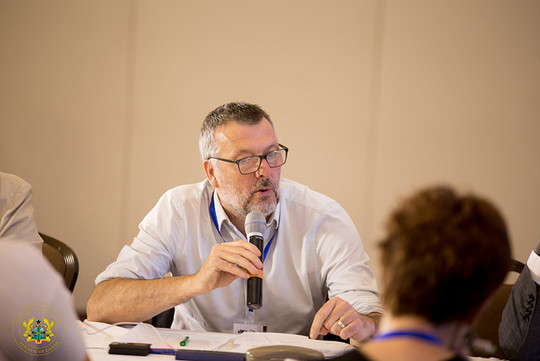Among the different recommendations listed in the Platform, the IFJ urges governments to immediately open negotiations with the GAFAM– Google, Apple, Facebook, Amazon, Microsoft - to collect a tax on revenues generated within their national territory. This strategic taxation should be used to support journalism in the aftermath of the pandemic.
Jeremy Dear is the deputy general secretary of the IFJ. He tells us about the rationale behind the demand for the taxation of GAFAM and how it could help save the press.
Why do you think it is urgent to negotiate with GAFAM to try to rebalance the media market?
Quite simply because these companies, above all Google and Facebook, make huge profits from the work of journalists and independent news outlets, starve media of advertising revenue but avoid taxation.
Between them Facebook and Google take around 61% of all digital advertising spend – a figure which is growing year on year. Facebook alone made over $20bn profit in 2018. Its 2019 revenues topped $70bn.
At the same time, independent media, and above all local media are starved out of markets, creating vast news deserts. As media lose revenue, they cut jobs – journalists. They reduce pages in papers or axe editions or merge titles. They close radio stations or cut back on TV news programming.
And eventually, there is no-one left to ask the questions, to hold local power to account, to expose corruption, to stand up for the public interest. There is a democratic deficit.
This has been happening for years – this hollowing out of newsrooms. But in the face of the Covid-19 pandemic the situation is getting much worse, very quickly.
It is ironic that this is happening at a time when all media are enjoying booming audiences but those benefiting economically are the tech giants who have seen revenues soar
What does the IFJ and its affiliates propose to do with funds from GAFAM taxation?
What we want is for the tech giants to pay their fair share – for tax justice. They are news publishers and should be regulated and taxed as news publishers. We believe a digital services tax could generate a huge amount of money which can help both independent journalism survive in the face of the crisis and help build a new model of independent journalism in which information is not a commodity to be bought and sold by hedge funds and corporations but is a right which should be available to all communities.
At the moment Google and Facebook are trying to portray themselves as saints and saviours by handing out grants to selected media. We don’t want the crumbs from their table. We want them to pay their fair share. The big six US tech firms have been accused of “aggressively avoiding” $100bn (£75bn) of global tax over the past decade. That must stop!
We believe that a global fund, managed by representative media and journalists’ organisations, with a remit to promote public interest media can create a sustainable future for media and guarantee citizens their rights to an independent pluralistic media.
Such media landscape would be a mix of public service and private media, for profit and not for profit organisations funded within a public interest framework. It would guard against hedge funds or tech giants destroying media they deem unprofitable or dispensable, it would provide decent work for journalists and it would hold power to account.
What role do central governments and the European Union play in all this?
The money is there - all that is lacking is political will. For years governments have been running scared of the tech giants. But there are some small but encouraging signs that that may be changing. The pandemic has made citizens – and politicians - realise the value of media. Public interest media is a public good and it needs action to sustain and support it.
A number of governments have started looking at digital services taxes or levies. Unions in many countries are lobbying their governments demanding action. The EU could play a very important role. If individual governments fear the power of the tech giants, a united EU response would offer protection and the size of the EU as a market would mean the tech companies would be less likely to be able to bully individual politicians.
Some countries are currently looking at options to allow newspapers to bargain collectively with digital platforms. Australia, the European Union and several individual European countries have already moved in this direction, and similar legislation is pending in the U.S. The problem is such a move favours the survival of big corporate media chains at the expense of smaller media and does little to build new media.
During the coronavirus pandemic, the Media world faced a severe blow: do you think the repercussions are also an opportunity to formulate a new phase for the journalism environment?
They have to be, otherwise the news deserts will grow and a veil of darkness will fall over cases not just of fraud, corruption and wrongdoing but also vital information about health, climate change, education and local government.

